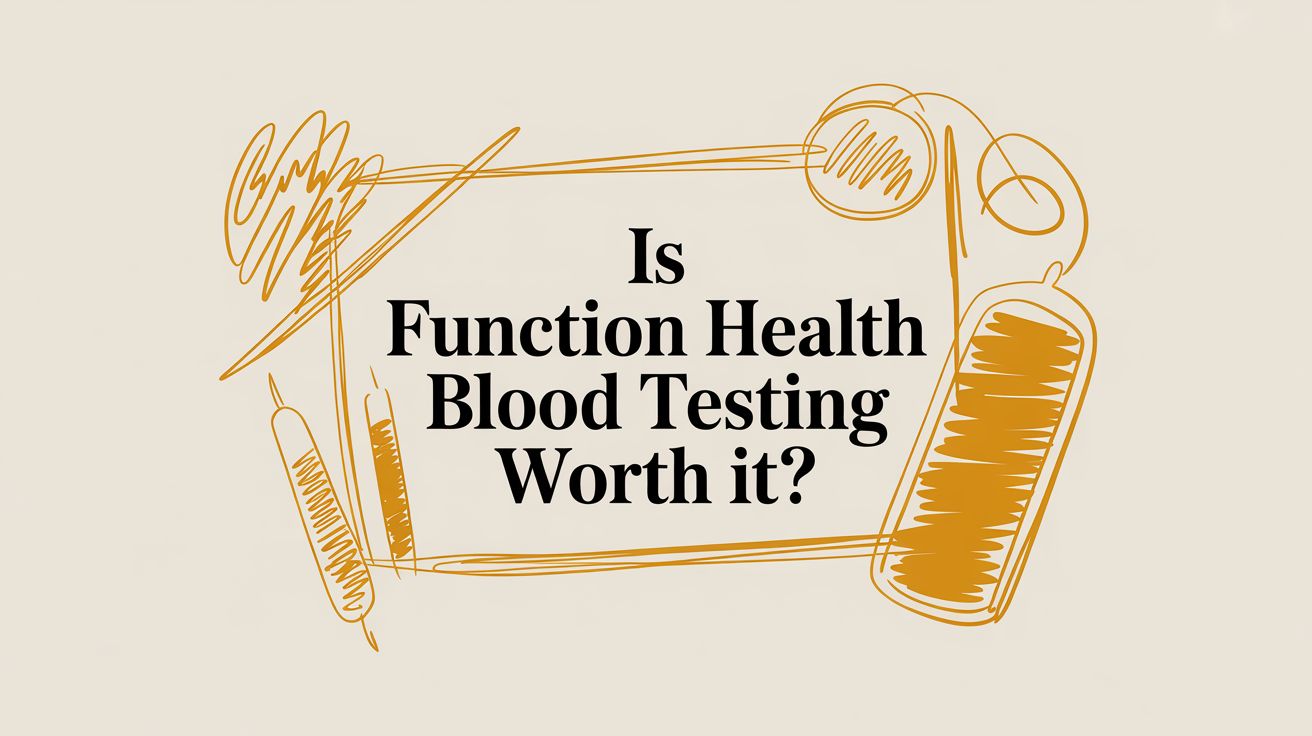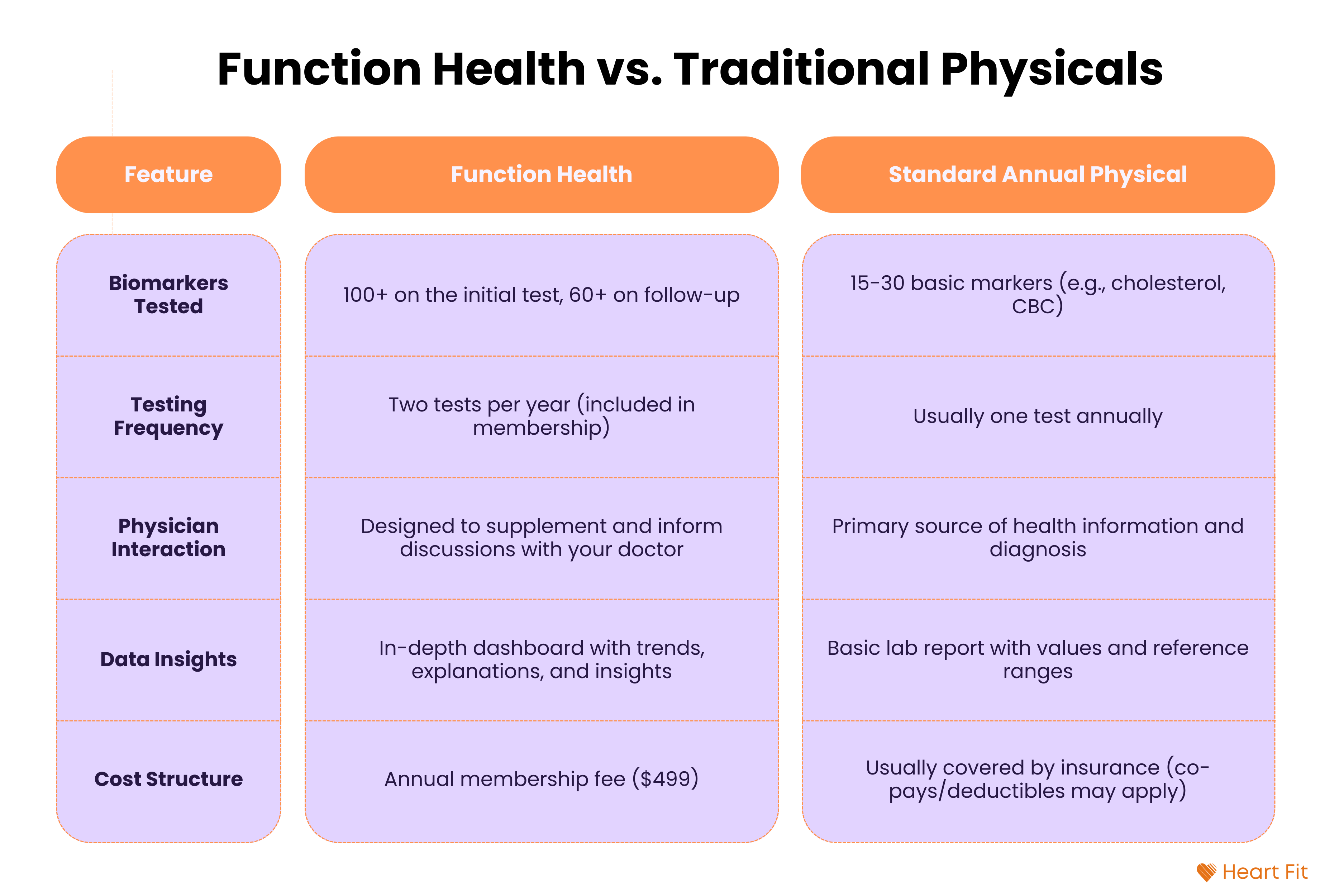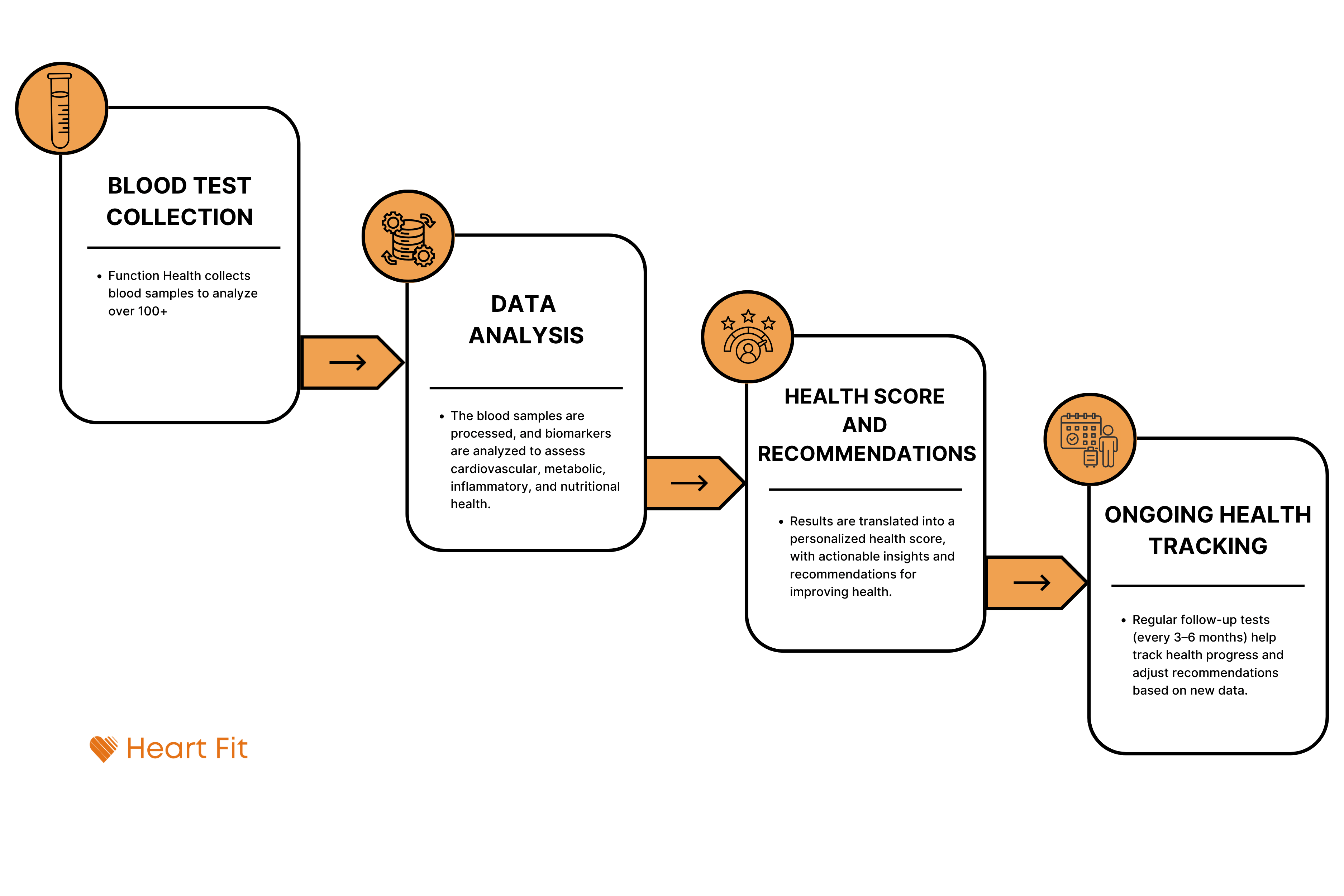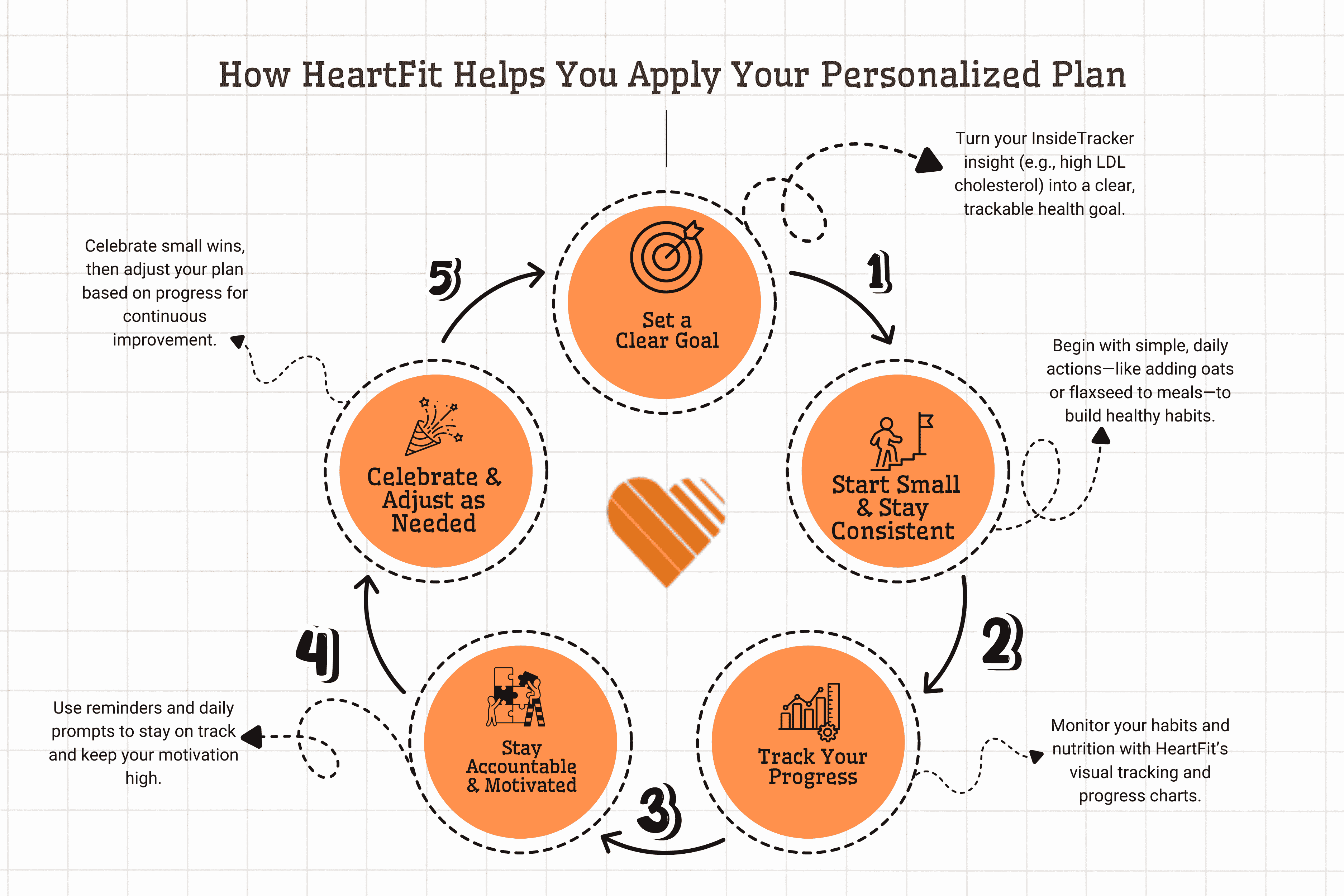Is Function Health blood testing worth it? We review the cost, 100+ biomarkers, accuracy, and the real-world value of this comprehensive health service.

If you've ever left an annual physical feeling like you only got a tiny snapshot of your health, you're not alone. Function Health offers a much deeper look, moving beyond the standard check-up to give you a comprehensive picture of what's really going on inside your body.
So, is it worth it? For many people, the answer is a big yes. It’s a great fit for anyone who wants to be proactive about their health, spot potential risks before they become problems, and have truly data-driven conversations with their doctor.
This article is for informational purposes only and is not a substitute for professional medical advice. Always consult with a qualified healthcare provider before making any lifestyle or medication changes.
Function Health is a membership that provides in-depth blood testing designed to help you understand and track your health from a preventive angle. Think of it this way: your typical annual physical runs a very limited panel of tests. Function, on the other hand, analyzes over 100 biomarkers—specific, measurable substances in your blood—giving you a detailed story of your body's inner workings.
The whole idea is to shift from reactive healthcare—waiting until you're sick to get treatment—to proactive wellness. By establishing a personal health baseline and tracking it over time, you can catch subtle changes in your biomarkers early on. This allows you and your doctor to address potential issues before they escalate. As the Centers for Disease Control and Prevention (CDC) often points out, early detection is one of the most powerful tools for living a longer, healthier life.
Before we dive deeper, let's look at how this approach stacks up against the familiar yearly check-up.
The table below gives a quick, high-level comparison between the comprehensive service from Function Health and what you'd typically expect from a standard annual physical.

As you can see, Function is built for a different purpose—to give you a continuous, data-rich view of your health journey, rather than just a single snapshot in time.
The service is built around a simple annual membership model. Here’s how it usually plays out for a new member:
Launched in 2023 by Dr. Mark Hyman and a team of functional medicine leaders, Function Health makes this level of detailed testing far more accessible. The annual fee is $499, which covers over 100 biomarker tests.
To put that in perspective, trying to order a similar panel of tests on your own through the traditional U.S. healthcare system could easily cost you over $3,000. By including two tests in the membership, the model encourages you to monitor trends over time, which is where the real value for early risk detection lies. You can discover more insights about Function Health’s model and its approach to preventive care on their site.
When you get a standard blood test from your doctor, you’re usually just scratching the surface—maybe checking basic cholesterol and glucose. Function Health dives much deeper, analyzing over 100 biomarkers to build a comprehensive story about your health. The idea isn’t just to hand you a page of numbers but to help you understand the narrative they create together, revealing patterns a typical physical might easily miss.
Instead of just one or two data points, you're getting a panoramic view of your body's interconnected systems. To make sense of it all, these markers are grouped into specific categories you can actually act on.
Seeing over a hundred results at once can feel like a lot, but Function organizes everything into logical buckets. Each one represents a vital part of your well-being, helping you see exactly where you're thriving and where you might need to focus your efforts.
Here are the key areas they look at:
The real magic happens when you start connecting the dots. High inflammation (hs-CRP) paired with an elevated ApoB count tells a much more urgent story about your cardiovascular risk than either number would on its own. In the same way, chronically low B12 might finally explain that nagging fatigue that other tests couldn't pinpoint.
In short, Function Health provides a multi-dimensional view of your health by analyzing how different systems interact, rather than looking at single markers in isolation.
If you're trying to figure out which of these comprehensive services is right for you, our Function Health vs. Mito Health review breaks down the key differences in more detail.
This article is for informational purposes only and is not a substitute for professional medical advice, diagnosis, or treatment. Always seek the advice of your physician or other qualified health provider with any questions you may have regarding a medical condition.
So, what does the Function Health experience actually look like from start to finish? Knowing the practical steps involved can help you figure out if this deep dive into your health is the right move for you. The whole process is broken down into a few simple phases.

Everything starts on the Function Health website. You’ll create an account and purchase the annual membership, which covers two comprehensive blood tests for the year. After you're signed up, the platform walks you through scheduling your blood draw at a local Quest Diagnostics lab. Partnering with a trusted name like Quest ensures the samples are handled with clinical-grade accuracy.
A big question people have is about the amount of blood needed. Let's be clear: this is a lot more than your standard physical. A typical check-up might take a couple of vials. For Function, you'll make two separate visits, and they'll draw about 35 mL (that's roughly 10 vials) each time.
This adds up to 70 mL in total—a 5x increase over a normal physical. While that might sound like a lot, it's what's needed to analyze over 100 biomarkers. For perspective, it's still well below the 500 mL drawn during a standard blood donation, a procedure the American Red Cross considers perfectly safe. If you want to see a firsthand account, you can explore detailed insights on the process.
Once your samples are collected, the results start trickling into your online dashboard within a few days to a week. The real magic here is how they present the data. Instead of just dumping a confusing list of numbers on you, Function organizes everything into a clean, intuitive interface.
The dashboard uses a simple, color-coded system, so you can see at a glance which biomarkers are in an optimal range and which ones might need a closer look. Every result comes with a straightforward explanation of what it measures and why it matters for your health. It’s a great way to demystify complex medical info and make it genuinely accessible.
This article is for informational purposes only. The platform provides valuable insights, but all results should be interpreted in partnership with a qualified healthcare professional who can provide context based on your complete medical history and individual health needs.
A core feature of the membership is the second test, scheduled for three to six months after your first one. This isn't just a simple repeat; it’s a strategic re-test designed to track your progress.
This follow-up allows you and your doctor to see the real-world impact of any changes you've made—whether that’s to your diet, supplements, or lifestyle. It turns your health data from a one-time snapshot into a dynamic roadmap for your well-being.
When a report with over 100 of your body's biomarkers lands in your inbox, your first thought is probably, "Can I trust this?" It's a fair question, and the answer is a big part of deciding if Function Health is worth the investment.
The good news is that Function Health doesn't run the tests themselves. They partner with Quest Diagnostics, a major lab that holds both CLIA (Clinical Laboratory Improvement Amendments) and CAP (College of American Pathologists) certifications. These are the exact same quality standards your doctor's office and local hospital rely on. So, the raw data from your blood draw is about as accurate as it gets.
The tests are medical-grade, plain and simple. For most of the biomarkers they measure, the error rate is incredibly low—often less than 1%. That level of precision is crucial when you're looking at complex health data, especially for sensitive markers where even tiny shifts can be a heads-up about a potential risk.
For example, Function's report might flag a borderline result for homocysteine, an amino acid tied to heart health. According to a 2024 literature review in Cureus published on PubMed, high homocysteine is associated with cardiovascular risks, so catching even slightly elevated levels early can trigger important lifestyle changes. This kind of precision gives you and your doctor a solid, reliable foundation to start a meaningful health conversation. You can read more about their testing accuracy on their site.
But here’s the thing: while the lab data itself is rock-solid, it's just one piece of a much larger health puzzle. It’s just as important to understand what these results can—and can't—tell you.
Function Health does an excellent job of showing you what's happening inside your body. It can raise a flag that your inflammation is high, or that your thyroid hormones aren't in their optimal range. What it can't always tell you is why.
Think of it like the diagnostic computer for your car. It can flash a warning light for "engine trouble" (your high biomarker), but it can't always pinpoint the exact frayed wire that's causing the problem.
This service is fantastic at measuring downstream biomarkers. In other words, it identifies the effects of potential health issues, but not always their genetic or root causes. It’s a powerful screening and monitoring tool, not a substitute for a formal diagnosis from a doctor.
Let's say your results show low Vitamin D. The report won't tell you if that's because of your diet, a lack of sun, or a genetic issue that makes it harder for you to absorb it. That distinction matters. If you're curious about how this compares to other services, we break down the differences in our guide on Function Health vs. Everlywell accuracy.
Ultimately, your results give you a detailed snapshot of your health at one moment in time—an invaluable dataset. But this data is meant to start a conversation, not end it. The most critical next step is to review these findings with your doctor, who can put them in the context of your personal health history to build a complete and actionable plan.
Getting a detailed report with over 100 biomarkers is a fantastic start. But let's be honest, the real value in a service like Function Health isn't just seeing the numbers—it's what you do with them next. Raw data is just potential; turning that knowledge into a concrete plan is what actually moves the needle on your health.
Your very first move should be to sit down with a qualified healthcare provider. They’re the ones who can look at your unique biomarker patterns, put them in the context of your personal health history, and help you map out a safe and effective game plan.
This article is for informational purposes only and does not constitute medical advice. Always consult with a healthcare professional before making any changes to your diet, exercise routine, or supplement regimen.
Once you and your doctor have pinpointed the key areas to focus on, the real work begins: fitting that advice into your everyday life. This is where habit-building becomes absolutely critical. A vague goal like "improve my heart health" is easy to forget, but a specific, measurable action like "eat 30 grams of fiber daily" is something you can actually do.
And that's where technology can be a huge help. Habit-tracking apps are great for breaking down those big goals into small, manageable daily tasks that keep you motivated and on track.
To bridge that gap between knowing what to do and actually doing it, a good app can make all the difference. While there are plenty of options out there, here are a few we recommend for turning your health plan into a daily reality.
An app like HeartFit is designed to close that crucial loop between getting your health insights and putting them into practice, day in and day out. By giving you daily reminders, tracking your progress, and celebrating the small wins, it helps you build the momentum you need for real, long-term success.

After all, as the American Heart Association points out, it's the consistent, small changes that make the biggest difference in preventing chronic disease. A little tech support can make that consistency a whole lot easier to achieve.
After diving deep into the data, the process, and the price tag, we have to ask: Is Function Health's blood testing actually worth it?
Well, there’s no one-size-fits-all answer. It really comes down to your personal health philosophy, your goals, and your budget. This service hands you an unprecedented amount of data, offering a uniquely detailed, proactive look under the hood of your body’s complex machinery.
https://www.youtube.com/embed/Hb4VbX3tVxQ
Function Health really shines for anyone who's highly motivated to take the reins of their own wellness. It provides the kind of granular biomarker analysis needed to spot potential red flags long before they ever become symptoms—a key strategy for preventing chronic illness, as recommended by the CDC. If you’re a biohacker, someone with a troubling family history of disease, or just looking to truly optimize your health, the value is pretty clear.
That said, it isn't the right fit for everyone. The out-of-pocket cost is a real consideration, and let’s be honest, staring at a dashboard with over a hundred data points can feel like trying to drink from a firehose without some professional guidance. It’s probably not the best option if you're on a tight budget or simply prefer a more traditional, doctor-led approach to managing your health.
To help you figure out if it's right for you, I've put together a quick breakdown of who stands to gain the most from Function Health.
Ideal Candidate Profile, Potential Benefits Considerations: The Proactive Health Enthusiast. Get way ahead of health issues with early detection across 100+ biomarkers. You'll walk into your doctor's office armed with data, not just feelings. The $499 annual fee is an out-of-pocket expense. It's not something your health insurance is likely to cover. The Data-Driven Biohacker Dive into advanced metrics like ApoB and Lp(a) to fine-tune your nutrition, fitness, and supplement stacks for peak performance. Information overload is a real risk. These results are only as good as the action plan you build from them, which takes effort. Someone with a Family History of Disease, keep a close eye on specific risk factors tied to their genetics. This can offer huge peace of mind and create a clear path for preventive care. The service tells you what is happening with your biomarkers, but it doesn't always tell you why. You'll likely need further medical investigation for that.
Ultimately, this is a powerful tool for understanding your body, but it is not a medical treatment.
Final Takeaway: Function Health is a fantastic tool, but it's not a replacement for medical care. It provides the map, but you and your doctor still need to navigate the journey together.
So, is Function Health worth it? The answer is yes—if you're ready to invest both financially and personally in a deeply proactive health strategy. Before you sign up, have a conversation with your physician to make sure this comprehensive tool fits your specific needs and health journey.
Disclaimer: This article is for informational purposes only and is not a substitute for professional medical advice. Always consult with a qualified healthcare provider before making any lifestyle or medication changes.
If you're weighing whether Function Health is the right move for you, you probably have a few questions. Let's clear up some of the most common ones.
Right now, Function Health doesn’t accept health insurance. This means the annual membership is an out-of-pocket cost.
The good news? You might be able to use funds from your Health Savings Account (HSA) or Flexible Spending Account (FSA) to pay for it. Policies can vary quite a bit, so it's always a smart idea to check with your specific HSA or FSA provider to confirm it's an eligible expense.
The biggest differences come down to two things: how deep the testing goes and how the sample is collected. Function Health gives you a massive, comprehensive look at over 100 biomarkers. To do that, you need a professional blood draw at a lab like Quest Diagnostics, which ensures a large, high-quality sample for all that analysis.
Services like Everlywell, on the other hand, tend to zero in on specific health areas (like food sensitivities) and test for fewer markers. They often rely on at-home finger-prick kits. While convenient, these kits are generally less comprehensive and just can't provide the same depth of data you get from a full venous blood draw.
Nope, you don't need to get a prescription from your own doctor. Function Health is a direct-to-consumer service, which means a physician in their network will authorize the lab order for you as part of the process.
That said, both Function Health and major medical organizations like the American Medical Association strongly recommend that you share and discuss your results with your primary care provider. This is crucial for making sure the data is interpreted correctly within the larger picture of your personal health history.
According to institutions like the Mayo Clinic, an optimal ApoB (Apolipoprotein B) level is generally considered to be less than 90 mg/dL. For individuals at high risk of cardiovascular disease, physicians may target an even lower level. It's essential to discuss your specific ApoB result and target range with your healthcare provider.
For even more answers, you can also check out our own frequently asked questions section.
Ready to turn your health data into sustainable habits? Heart Fit helps you build a personalized plan from your results and stick to it with a motivating, gamified system. Start your free trial today at https://www.heartfit.ai.